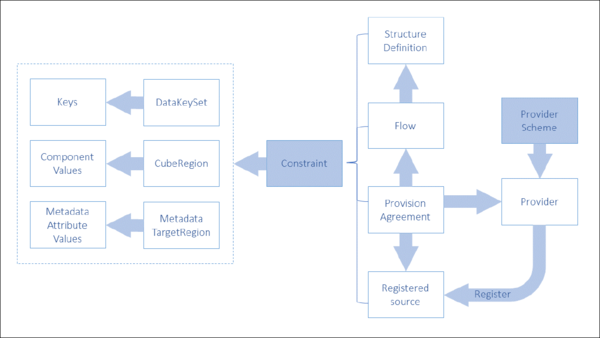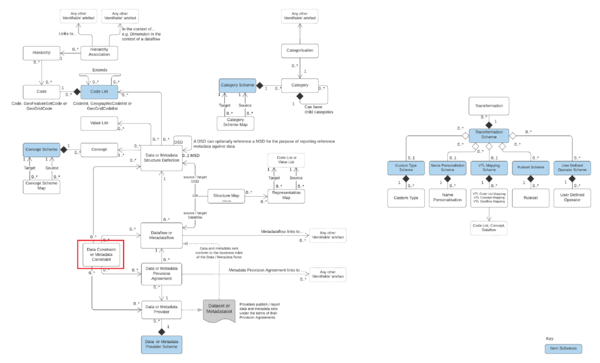Difference between revisions of "Constraint"
Jump to navigation
Jump to search
| Line 35: | Line 35: | ||
<p>Each [[Constraint|Constraint]] references a type of Structure and within that type many structures can be constrained.</p> | <p>Each [[Constraint|Constraint]] references a type of Structure and within that type many structures can be constrained.</p> | ||
| + | |||
| + | ==Conventions== | ||
| + | '''Constraqint IDs''' | ||
| + | IDs are conventionally uppercase using underscores '_' as separators if required. Examples: | ||
| + | |||
| + | {| class="wikitable" | ||
| + | |- | ||
| + | ! Agency !! Concept Scheme ID !! Description !! SDMX-ML | ||
| + | |- | ||
| + | | ECB || EXR1 || South American Exchange Rates || [https://registry.sdmx.org/ws/public/sdmxapi/rest/dataflow/ECB/EXR1 SDMX-ML] | ||
| + | |} | ||
Revision as of 07:13, 31 August 2022
Contents
Data Constraint or Metadata Constraint Overview
A SDMX Data or Metadata Constraint provides the ability to further restrict the allowable content of a Codelist in the context of a Data or Metadata Structure Definition, a Data or Metadata flow, a Provision or Metadata Agreement, or Data or Matadata Provider. Collectively these are termed as Constrainable Structures.
Structure Properties
| Structure Type | Standard SDMX Structural Metadata Artefact |
|---|---|
| Maintainable | Yes |
| Identifiable | Yes |
| Item Scheme | No |
| SDMX Information Model Versions | 3.0 |
| URN - DataConstraint namespace | urn:sdmx:org.sdmx.infomodel.datastructure.DataConstraint |
Context within the SDMX 3.0 Information Model
Usage
Constraints can be used to specify a subset of the theoretical content of data set or metadata set which can be derived from the specification of the DSD or MSD.
Each Constraint references a type of Structure and within that type many structures can be constrained.
Conventions
Constraqint IDs IDs are conventionally uppercase using underscores '_' as separators if required. Examples:
| Agency | Concept Scheme ID | Description | SDMX-ML |
|---|---|---|---|
| ECB | EXR1 | South American Exchange Rates | SDMX-ML |

